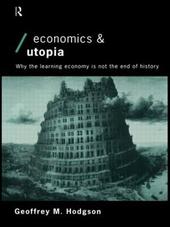
|
Economics and Utopia: Why the Learning Economy is Not the End of History
Paperback
Main Details
| Title |
Economics and Utopia: Why the Learning Economy is Not the End of History
|
| Authors and Contributors |
By (author) Geoff Hodgson
|
| Series | Economics as Social Theory |
|---|
| Physical Properties |
| Format:Paperback | | Pages:368 | | Dimensions(mm): Height 234,Width 156 |
|
| Category/Genre | Economic theory and philosophy
Economic systems and structures |
|---|
| ISBN/Barcode |
9780415196857
|
| Classifications | Dewey:330.122 |
|---|
| Audience | | Undergraduate | | Postgraduate, Research & Scholarly | | Professional & Vocational | |
|---|
| Illustrations |
2 black & white tables
|
|
Publishing Details |
| Publisher |
Taylor & Francis Ltd
|
| Imprint |
Routledge
|
| Publication Date |
3 December 1998 |
| Publication Country |
United Kingdom
|
Description
For many, the East European revolutions of 1989 and the disintergration of the USSR represented not only the overdue demise of Soviet-style communism, but also the obsolescence of all utopian ways of thinking. History has reached its end-state in the form of a victorious liberal-democratic capitalism amd all attempts to imagine an alternative social order were now damned as both futile and quixotic. Economics and Utopia rejects this stifling dogma in the belief that utopian thinking is a necessary condition for the development of alterntive solutions to the problems of the present and thus for historical progress. Beyond Utopia? is emphatically not an attempt to breathe new life into existing utopian models, whether state socialist or neo-liberal, which are seen as misunderstanding the nature of learning and knowledge in a modern economy. The author's utopianism is based on an examination of the potential for an alternative future based on the growth of knowledge-intensive production, one whose feasibility world derive from its ability to respond to the needs of rapidly-changing industrial economies. More than just a consideration of economic alternatives, Beyond Utopia? is also an important contribution to the critique of mainstream economics which is considered to be unable to understand the market system except in the most formal and abstract terms. Thus in order to imagine new worlds a change in our economic thinking is necessary, one that focuses on the relationship between learning and knowledge in economic systems, as well as on the institutional and cultural context of different economic models.
Reviews"This is a brilliant, very ambitious and sensible work. It is more a work of diagnosis and critique than of prescription and prognosis, but it does focus on key elements of any future economy: diversity, learning, the structure and culture of governance and the forms of participatory democracy.... The work further enhances the reputation of Hodgson as the leading institutionalist theorist of the present day, more important, it should stimulate further work by others."-Warren Samuels, Michigan State University "This book is exceedingly pertinent to current economic discourse. It is a most creative and persuasive contribution, adding important and new insights both in particular and in general, and exhibiting a superior level of professional scholarship, awareness and capacity."-Marc Took, California State University, Sacramento
|